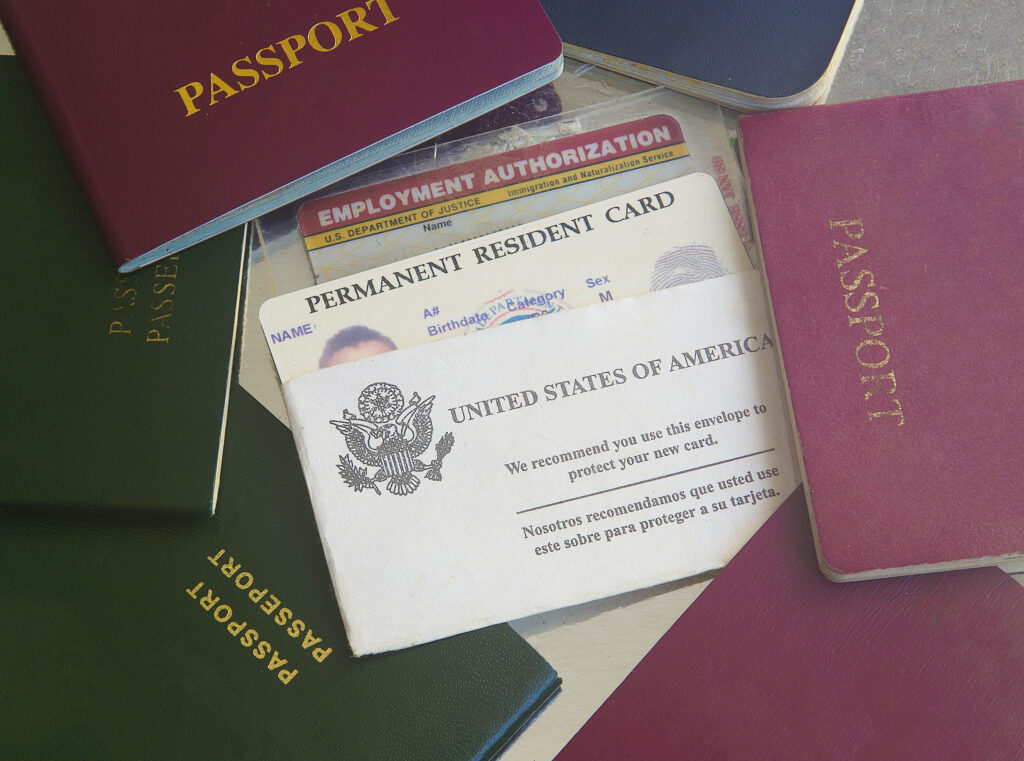

Navigating the path to an employment-based green card might seem like a daunting process. However, it’s a journey that holds the promise of new opportunities, personal growth, and a chance to make your mark in a diverse and dynamic working landscape. We aim to simplify the process, outlining the steps you need to follow, and providing essential information to help you navigate through the complexities of obtaining an employment-based green card.

The employment-based green card is a permanent residence permit that allows foreign nationals to reside and work in the United States. Generally, employers are responsible for sponsoring foreign workers through this process, with exceptions. There are five categories of employment green card categories.
This employment-based preference category is reserved for individuals who possess exceptional abilities in fields such as sciences, arts, education, business, or athletics; distinguished professors or researchers; and executives or managers of multinational companies. No Labor Certification is required for the EB-1 category. The demonstration of extraordinary ability must be supported by evidence based on specific criteria, which can be found on the USCIS website link Employment-Based Immigration: First Preference EB-1 | USCIS. These complex and evidence-intensive petitions can be prepared and submitted by a qualified immigration lawyer who specializes in EB-1 filings. The process to obtain Permanent Residency status through the EB-1 category is as follows:
The EB-1A category is for people with:
– extraordinary ability in sciences, arts, education, business or athletics which has been demonstrated by sustained national or international acclaim and whose achievements have been recognized in the field through extensive documentation;
– who seek entry to continue work in the area of extraordinary ability; and
– whose entry will substantially benefit the United States.
In this category, the individual doesn’t need an employer to sponsor him or her, but it is a very high standard. The individual will have to prove that they have risen to the top in their field through objective documentation from recognized experts in their field.
This category is for people who are:
– recognized internationally as outstanding in a specific academic area;
– have 3 years experience in teaching or research in the academic area; and
– who seek entry for (a) a tenure teaching position, (b) a comparable position at a university or institute of higher education to conduct research, or (c) a comparable position to conduct research with a private employer if it employs at least 3 persons full-time in research activities and the department or institution has achieved documented accomplishments in the academic field.
In this category, the individual needs an employer to sponsor him or her, but it is a very high standard. The individual will have to prove that they are in the top percentage of the field through objective documentation from recognized experts in their field. However, the legal standard is slightly lower than the EB-1 Extraordinary Ability category. Regardless, extensive documentation proving that the researcher is outstanding or has international acclaim is required by the USCIS.
This category is for people who are:
– employed for one year in the last three years outside the United States by a branch, affiliate, parent or subsidiary of a United States company; and
– who seek entry in order to continue to render services to the same employer in the United States in a capacity that is managerial or executive in nature.
In this category, the individual will require employer sponsorship. In addition, the USCIS has embraced a very extreme definition of who qualifies as an executive or manager in recent years. Just because you hold L-1A status as an executive or manager does not automatically mean you will get your green card approved under this category. A good review of your case by a qualified attorney is required.

The EB-2 category is designated for individuals who are part of the academic community with advanced degrees or for individuals with extraordinary talent in the fields of arts, sciences, or commerce. A Labor Certification is mandatory unless the candidate can secure a National Interest Waiver (NIW). (The NIW process will be explained below.) While obtaining a Labor Certification, commonly referred to as PERM (Program Electronic Review Management), the employer will need to fulfill the first stage in the employer’s submission of an immigration petition on behalf of foreign worker. The PERM labor certification process requires the employer to actively search for potential American citizen or US permanent resident applicants for the foreign worker’s position to determine if there are any suitable, capable, and willing candidates for the position. If there are no American citizen or US permanent resident applicants within the United States who are suitable, capable, and willing to accept the job offer based on specified criteria such as salary, work location, educational and/or professional experience, then the employer can submit a PERM labor certification application to the U.S. Department of Labor (DOL). As part of the application process, the employer must be able to demonstrate and certify their capacity to pay a salary predetermined by the Department of Labor (DOL) at the time of the individual securing lawful permanent resident status. The employer may provide financial documentation such as an annual report, federal income tax return, or audited financial statement to substantiate their ongoing ability to pay the salary. A labor certification must be approved by the DOL before the employee can proceed to the subsequent stage of the process, which involves filing a Form I-140, Immigrant Petition for Alien Workers.
The individual must possess the necessary educational background and/or work experience qualifications for a job position that requires either:
The individual must demonstrate exceptional expertise in the fields of science, arts, or business. Exceptional ability refers to a level of proficiency significantly higher than what is typically encountered in these domains. To qualify as meeting the exceptional ability standard, an individual must fulfill at least three of the criteria listed in the Employment-Based Immigration: Second Preference EB-2 | USCIS. As these fall under the employment-based subcategory, the employer must fulfill any requirements specified in the labor certification, if applicable.
Individuals seeking a National Interest Waiver are requesting that the labor certification be waived due to their potential benefit to the United States. The qualifications for a NIW are not explicitly defined by law; instead, USCIS evaluates three factors:

This preference is allocated for individuals who have expertise, proficiency, and other related qualifications. An employer must submit a Labor Certification for the EB-3 category. The employer is required to follow the same Labor Certification procedure as stated in the EB-2 section. Once the labor certification is approved by the DOL, the employee can move on to the next phase of the process, which involves submitting a Form I-140, Immigrant Petition for Alien Workers. An individual may qualify for the EB-3 category if they fall under any of the subsequent subcategories.
Skilled workers are individuals whose occupations necessitate a minimum of 2 years of training or experience, which is not temporary or seasonal. The skilled worker must fulfill the educational, training, or experience requirements of the job opportunity. Applicable post-secondary education can be considered as training.
Professionals are individuals whose job requires at least a U.S. baccalaureate degree or its foreign equivalent and is recognized as a professional in a specialized field. Education and experience cannot be substituted for a baccalaureate degree.
This subcategory is for individuals who perform unskilled labor that requires less than 2 years of training or experience and is not temporary or seasonal in nature.

This category is specifically for “special immigrants,” including religious workers, employees working at U.S. foreign service posts, retired employees of international organizations, noncitizen minors under the care of U.S. courts, and other groups of noncitizens. You can find a comprehensive list of “special immigrants” on this USCIS link. Employment-Based Immigration: Fourth Preference EB-4 | USCIS. It is not necessary to obtain a Labor Certification for this category. Some subcategories within the fourth preference require the employer to file Form I-360, Petition for Amerasian, Widow(er), or Special Immigrant, while in other subcategories, individuals are required to self-petition. An experienced immigration attorney can help applicants throughout the EB-4 petitioning process.
This preference is designed for individuals who invest either $1.8 million or $900,000 (if the investment is made in a targeted employment area) in a newly established commercial enterprise that employs a minimum of 10 full-time U.S. workers. If you believe you meet the eligibility criteria for the EB-5 category, it is advisable to consult with an experienced immigration lawyer who can guide you through the complexities of the EB-5 Immigrant Investor Process.
The process of obtaining an employment-based green card can be long and complicated, so it’s important to understand the requirements and processes involved to have a successful outcome. With the help of an experienced immigration lawyer, employers can ensure that they are fully compliant with all the necessary laws and regulations to obtain an employment-based green card for their foreign workers.

Employment based green cards provide individuals with many benefits that are not available to those who are in the U.S on temporary visas. A few of these benefits include:
Employment based immigrant visas are an excellent way for talented and qualified individuals to live and work in the United States. However, it is important to remember that the process can take a long time and there are several steps involved along the way. An experienced immigration lawyer will be able to help guide employers through the process, ensuring that all legal requirements are met so that their foreign workers can obtain their green cards without any delay.
It is highly recommended that employers seeking to hire foreign workers and/or obtain employment-based green cards for their current or prospective employees consult with an experienced immigration attorney as early on in the process as possible. An attorney can help employers understand the different immigrant visa categories and determine which one best suits their needs. They can also provide guidance and advice throughout the entire process, from filing labor certification applications to preparing and submitting Form I-140 petitions. An immigration attorney can also help employers avoid costly mistakes that could delay or even prevent their foreign workers from obtaining work authorization in the United States.

At our law firm, we are dedicated to providing comprehensive and personalized immigration solutions. Our experienced team of immigration attorneys are well-versed in all aspects of U.S. immigration law, and are committed to making the process as smooth and straightforward as possible. We understand that every case is unique, and we take the time to understand your specific needs and goals. Whether you’re an employer seeking to hire foreign talents or an individual looking to immigrate to the U.S, we’re here to help. Contact us online or call us at 919-833-0840 today to begin your journey towards achieving your immigration goals.